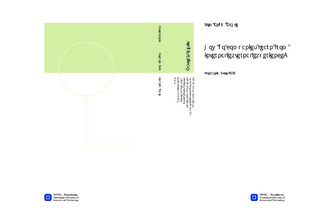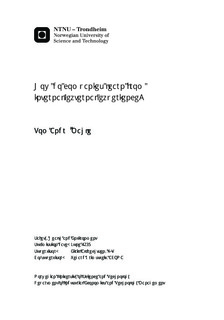| dc.description.abstract | SummaryThe thesis is a response to the fact that the Norwegian Petroleum Safety Authority questions the learning ability of the petroleum companies that are operating on the Norwegian continental shelf, despite that this is something that has been focused on for decades. The issue of learning has recently become increasingly important because of the increasingly number of oil & gas companies operating on the Norwegian continental shelf. The thesis aims at study factors of importance for the learning ability of companies (the thesis is not necessarily just aimed at oil companies) with regards to internal/external experience. The terms internal/external experience is explained more in detail in the introduction chapter. In order to reveal inhibitors/promoters towards a learning organization it where created following research questions:? What characterizes a learning organization?? What inhibitors to learn from safety experience exist?? What promoters to learn from safety experience exist?? What general and specific advices can be given to promote learning from internal/external experience?In order to answer these questions, it where chosen a qualitative research approach based on a semi-qualitative interview guide which aimed at reveal the experience of nine employees within three different oil companies with regards to learn from unwanted incidents/conditions, as well as systems to assure learning within their current employer. The interview results provided the basis for the empirical part of the thesis by using grounded theory to code the results in order to find out which issues that were repeatedly mentioned, in order to reveal patterns and also to see what issues that were not given so much thought. The empirical results where then compared to prewritten theory, which was developed by study known literature within organizational learning. It where on the basis of this comparison developed recommendations for how to learn from internal/external experience. The recommendations are applicable for the oil industry as a whole, and could probably also be used by companies in other industries. The main findings in the thesis can be summarized to the following content:? Cooperate across internal/external boundaries in order to learn from each other and ensure that everyone/as many as possible are able to participate/express their concerns and take signals from different actors seriously ? Be open for criticism even of established systems ? Ensure clarity regarding information, expectations, responsibilities, connections with following measures, distinguishing of incidents and different types of knowledge? Make things easy to follow/summarize ? Ensure that investigations performed and procedures developed are backed by existing ground rules? Map inabilities, long time issues and take into account conflicting interests as well as different assumptions? Ensure enthusiasm to new solutions and avoid giving blame? Important with a proactive management which do not back down from problems but instead engages in issues? Develop arenas where the aim is to study improvements | nb_NO |

